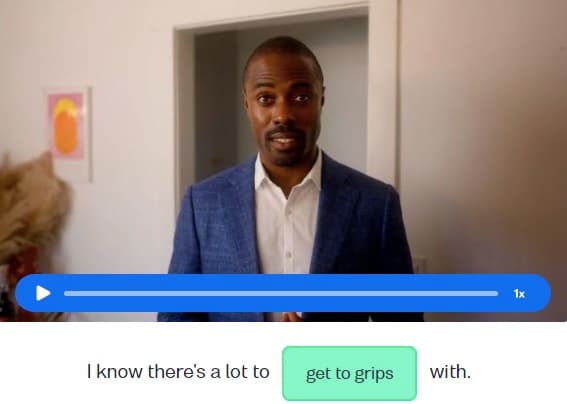I want to learn...
You’ve spent months working hard on your English. You’ve read the books, taken the lessons, and finished the courses. You feel ready to get out there and communicate with native speakers. Armed with your new knowledge and skills, you feel confident a world of meaningful interactions awaits you.
And then it happens. You meet native speakers and you understand some of what they’re saying. But they don’t sound like the people in your English class or textbook. Some of them sound completely different. That’s because they’re using colloquial language.
But don’t despair. We’re here to help you get over the challenge (and there’s no doubt about it — it’s a huge challenge for language learners) of colloquial language.
Read on to find out all about colloquial language, what it is, and how to use it.
What is colloquial language?
Colloquial language is the casual language ordinary people use in everyday conversations. It’s informal and conversational. It’s “What do you wanna do?” versus “What do you want to do?”
It’s the natural language you hear when native speakers are having conversations with each other. And colloquial language — with its regional differences — is the reason you can visit New York City and hear different phrases from those you hear in Sydney. People in New York and Sydney speak the same language but use their own, local colloquial expressions.
Because language learners spend so much time learning standard English — and because there is so much colloquial language — using colloquial expressions is tough. But it makes the difference between a good communicator and a great one (especially if your goal is to interact with native speakers).
Knowing how and when to use colloquial language will elevate your English skills. You’ll become a natural user of English.
Characteristics of colloquial language
Colloquial language is important for effective, everyday communication with native speakers. But what is it? Let’s take a detailed look at colloquial language.
1. Relaxed grammar
Compared to formal or standard English, colloquial language has more relaxed grammar rules.
People use sentence fragments (incomplete sentences or thoughts), contractions, and short forms.
Let’s look at some colloquialism examples:
Sentence fragment: “Had your lunch yet?” (It’s common in colloquial speech to drop modal verbs at the start of questions.)
Contractions: “I ain’t finished yet.” (“ain’t” is a common contraction in the USA for “am not”, “is not”, “are not”, “have not”, “has not”, “do not”, “does not”, “did not” — that’s a lot of uses, ain’t it?)
2. Informal vocabulary
There are tons of English words and phrases that are perfect for spoken communication but not suitable for professional or written communication. These are all colloquial phrases.
Here are some examples (with their standard meanings in brackets):
Buddy (friends)
Gig (a job)
Kids (children)
Munchies (hunger)
Stuff (things)
What’s up? (How are you?)
These are all common phrases for casual, spoken English. But you won’t come across any of them in formal writing.
Bonus tip: Try to use informal phrases like these when you speak English. You’ll sound like a natural.
3. Idiomatic expressions
Idioms are a huge part of colloquial speech (and hard work for language learners). They don’t make literal sense so the meaning isn’t usually obvious. When speaking with native speakers, wow them with your idiom knowledge. But there’s a fine line between using idioms well and using too many of them. Use them sparingly.
Here are some common idioms or colloquial expressions you can use:
“Bite the bullet” means to be brave when facing a difficult situation.
“Cost an arm and a leg” means very expensive.
“Kick the bucket” is a casual — and humorous — way to say someone has died. Be careful when you use this one obviously.
“Spill the beans” means to give away secrets.
“Take a rain check” is a polite way to turn down an invitation and suggest doing it at a later date.
“The ball is in your court” means it’s your responsibility, your turn to do something.
4. Local variations
To make things even more complicated (interesting?) colloquial language varies by region — even within the same country. Let’s take the UK for example. For such a small country, there is a huge variety of colloquial expressions.
Here are some ways people say ‘very good’ in different parts of the UK. Remember these all mean exactly the same things. (Check out our article on 5 expressions used in London also to get an idea!)
Ways people say “very good” in different parts of the UK
| Area | Version of “very good” |
|---|---|
| Birmingham | bostin |
| Liverpool | boss |
| London | sick |
| Manchester | mint |
| Newcastle | champion |
| Scotland | pure dead brilliant |
| Wales | tidy |
There are so many more examples of regional differences in just the UK. English is spoken natively in 20+ countries — there must be hundreds of ways to say “good.”
Colloquialism vs slang: How is colloquial language different from slang?
Slang is informal language that people in certain social groups, generations, subcultures, and regions use. Slang changes often — old people often complain they “can’t understand how kids speak nowadays.” Well, that’s because of the ever-changing nature of slang. Popular words come and go.
Slang is context and group specific. That means rock climbers have their own slang. People in their 40s have their own slang. Office workers have theirs. If you’re not part of the group, it can be hard to understand.
Let’s have a look at some of the most common slang that teenagers use nowadays:
‘Bet’ = OK in response to a question or statement
‘Bussin’ = Very good
‘Glow up’ = Change appearance”
‘No kizzy’ = I’m not lying
‘Slay’ = Do a good job
Remember, teenagers use these words. If you’re not part of that group and you try to use these words, don’t be surprised if people look at you funny.
Key differences between colloquial language and slang
Slang is a type of colloquial language. Colloquial language means the casual words that ordinary people use in everyday conversation. Slang is casual language that people use in everyday conversation — but it’s a unique subset of colloquial language because there are some important differences.
Slang terms come and go quickly. They soon fall out of fashion. Teenagers nowadays use the above phrases but teenagers 10 years ago had a completely different set of words. Colloquial language, on the other hand, sticks around. People have been saying “ain’t” for generations, for example.
Colloquial language is usually easier to understand. People of any age or social group can understand it. Slang is usually exclusive to certain groups of people. It’s less accessible and more exclusive.
Finally, slang and identity are closely linked. People can use slang to show they belong to a certain group. It’s part of their cultural and social identity (check out our article on popular slang words used in Spain and Latin America) For that reason, it often reflects the values and interests of the group. Colloquial language is the general language of an area — it doesn’t represent belonging to any particular group (except from its region).
Let’s look at some examples so you can see what I mean:
“I gotta run” is colloquial language to mean “I have to leave.” Almost all native-English speakers will understand this colloquial expression.
“I only rode ankle slappers today” is surfer slang for “There were only small waves today.” Almost no native-English speakers (only surfers) understand this.
These examples show how colloquial language is more accessible and common than slang, which is so closely linked to the group of people who use it.
How to deal with colloquial language and slang
If you can master colloquial language and slang, you’ll be a natural and effective communicator.
Colloquial language has relaxed grammar rules, informal vocabulary, short forms, and idiomatic phrases. Slang, on the other hand, is language that is used within a specific context and group. It can be hard for outsiders to understand. Colloquial language is more general and easier to understand.
So where do you start as a language learner? This all depends on your goals for learning English. If you have a specific area you want to visit or live in, learn that colloquial language. A good place to start with slang is by learning the words related to your hobbies. They’re a common source of slang.
It won’t be easy to master this kind of informal language. But when you do, you’ll be a natural English speaker.
AUTHOR

Barney Meekin
Newlanguages


